The Ajanta and Ellora Caves in Maharashtra, India, are two of the country’s most significant archaeological sites, showcasing ancient rock-cut architecture and breathtaking artistry. These caves have been designated as UNESCO World Heritage Sites. They date back to the 2nd century and offer a stride filled with the power of their murals and carvings and their high historical importance in the tourist attractions list. The Ajanta Caves are renowned mainly for beautiful Buddhist sculptures and paintings. The Ellora Caves sign the harmony of Buddhism, Hinduism, and Jainism.
Ajanta And Ellora Caves Location
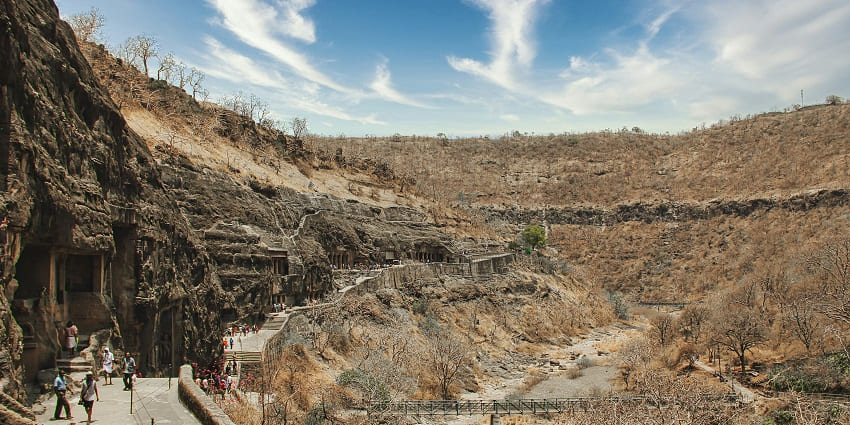
Photo: Setu Chhaya / Unsplash / Image For Representation Only
The caves are located in the Aurangabad district of Maharashtra, about 100 kilometres (62 miles) apart. The Ajanta Caves are situated near the small village of Ajanta, while the Ellora Caves are located near Ellora. Situated in the Sahyadri hills, both sites are surrounded by lush greenery and scenic landscapes, making them ideal for exploration and relaxation. The Ajanta Caves feature a series of rock-cut Buddhist monuments carved into a horseshoe-shaped cliff.
Suggested Read: Illuminating Places To Visit In Aurangabad At Night
How To Reach Ajanta And Ellora Caves
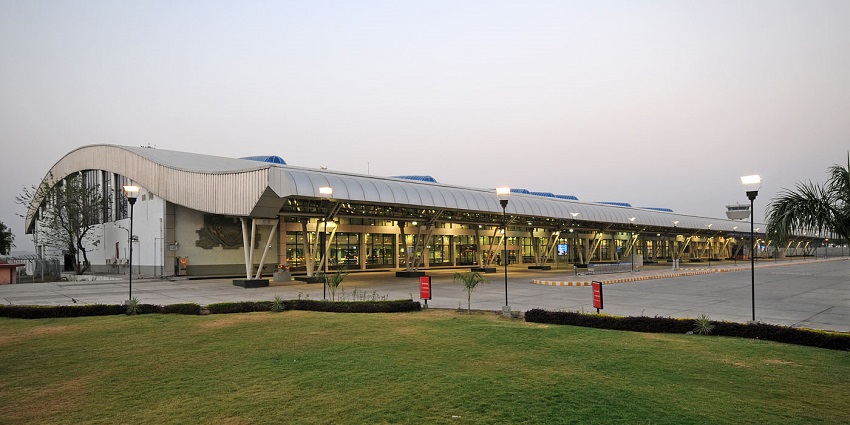
Photo: Vmahendra / Wikimedia Commons / Image For Representation Only
By Air: Aurangabad Airport (Chikkalthana Airport) is the nearest airport, about 30 kilometres from the caves. It offers connections to major cities like Mumbai, Delhi, and Pune, with taxis available for further travel.
By Train: Aurangabad Railway Station is well-connected, with frequent trains from cities like Mumbai and Delhi. Local transport options like taxis and auto-rickshaws are available to reach the caves.
By Road: The caves are accessible via National Highway 52, with state-run buses and private taxis operating from Aurangabad. Visitors can also rent cars for a more flexible travel experience.
Places To Visit In And Around Ajanta and Ellora Caves
1. Ajanta Caves
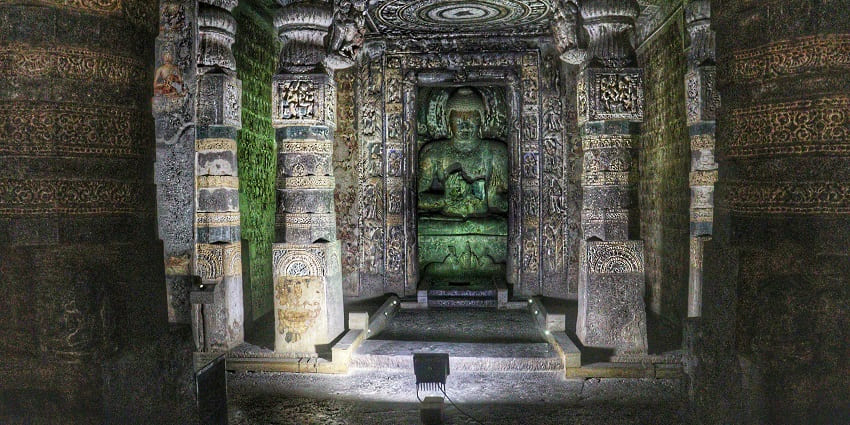
Photo: Priyanka Singh / Unsplash / Image For Representation Only
The Ajanta Caves, a group of 30 rock-cut Buddhist caves, are famous for their stunning frescoes and sculptures that date back to the 2nd century BCE. The caves were carved into a horseshoe-shaped cliff and were used as monastic quarters for Buddhist monks. The most notable caves include Cave 1, which features an impressive chaitya (prayer hall) adorned with beautiful murals and sculptures, and Cave 2, known for its exquisite carvings of the Bodhisattva Avalokiteshvara. The paintings in these caves depict various Jataka tales, showcasing the life and previous incarnations of Buddha.
Timings: 9 AM – 5:30 PM
Entry Fees: ₹40 for Indian citizens, ₹600 for foreign tourists
Suggested Read: Exploring The Mystical Pitalkhora Caves
2. Ellora Caves
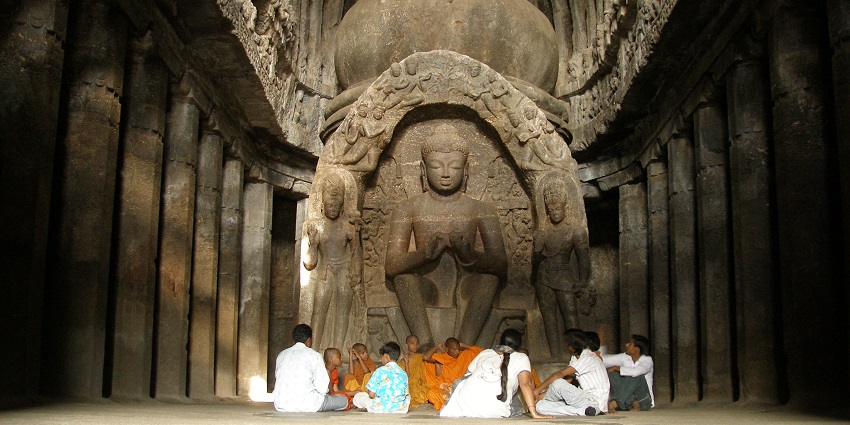
Photo: Vyacheslav Argenberg / Wikimedia Commons
The Ellora Caves are a magnificent complex of 34 caves representing Buddhism, Hinduism, and Jainism. Carved between the 5th and 10th centuries, these caves are renowned for their sculptures and monumental architecture. Among the highlights is Cave 16, the Kailasa Temple, an extraordinary rock-cut temple dedicated to Lord Shiva. This monolithic structure is an architectural marvel, featuring elaborate carvings of deities and motifs. The Ellora Caves also host beautiful Jain temples with detailed sculptures and serene interiors.
Timings: 6 AM – 6 PM
Entry Fees: ₹40 for Indian citizens, ₹600 for foreign tourists
3. Bibi Ka Maqbara
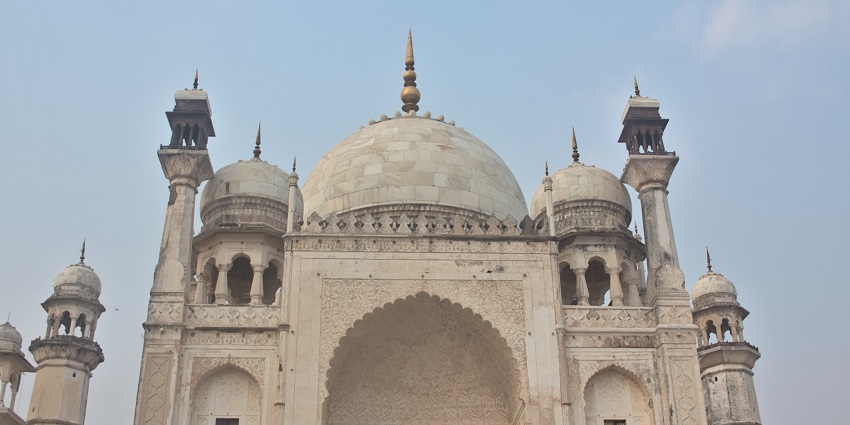
Photo: Shishirdasika / Wikimedia Commons
Located in Aurangabad, Bibi Ka Maqbara is a beautiful mausoleum built in the 17th century in memory of Begum Rabia Durrani, the wife of Mughal Emperor Aurangzeb. Often referred to as the “Mini Taj Mahal,” this architectural gem exhibits a blend of Persian and Indian architectural styles. The tomb is surrounded by beautiful gardens, reflecting the Mughal aesthetic of the era. Visitors can explore the carvings and stunning marble inlay work, which are reminiscent of the grandeur of the Taj Mahal.
Timings: 8 AM – 8 PM
Entry Fees: ₹10 for Indian citizens, ₹100 for foreign tourists
Suggested Read: Places To Visit In Thane With Friends
4. Daulatabad Fort
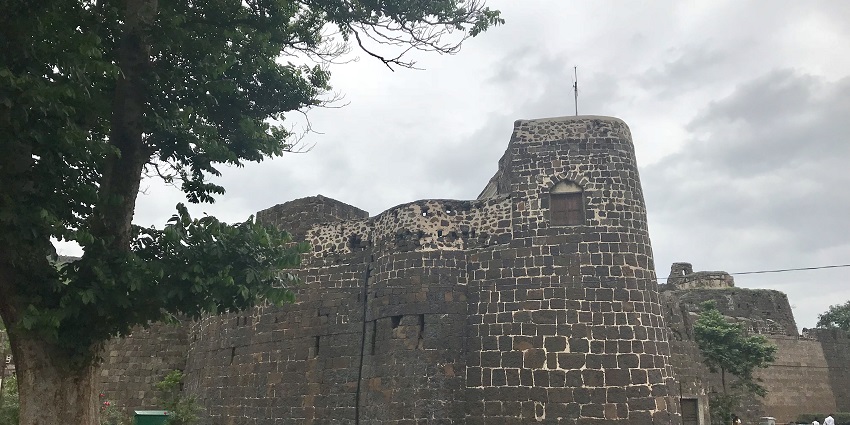
Photo: Khyateevyas / Wikimedia Commons
Situated about 15 kilometres from Aurangabad, Daulatabad Fort is a historic fortress that dates back to the 12th century. The fort is strategically located on a hill and offers panoramic views of the surrounding landscape. Visitors can explore its impressive architecture, including the massive gates, bastions, and a maze of passages. The fort has a fascinating history and was once the capital of the Delhi Sultanate. Highlights include the Chakra Dighi (a water reservoir), the Baradari, and the Royal Palace.
Timings: 9 AM – 5:30 PM
Entry Fees: ₹5 for Indian citizens, ₹50 for foreign tourists
5. Aurangabad Caves
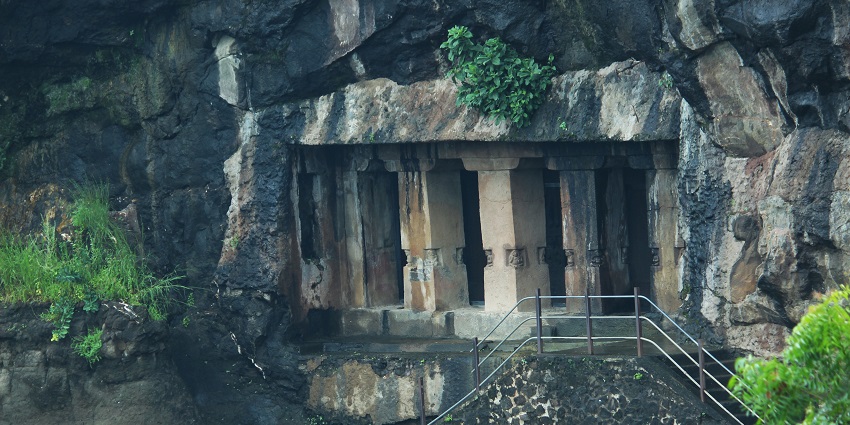
Photo: Yashs999 / Wikimedia Commons / Image For Representation Only
The Aurangabad Caves, a lesser-known but equally captivating site, consist of 12 rock-cut Buddhist caves dating back to the 2nd century BCE. These caves are on a hilltop with a city view and have detailed carvings and sculptures, including prayer halls and monasteries. The Cave 3 is notable for its beautifully carved pillars and the statue of Avalokiteshvara. The peaceful surroundings and smaller crowds make the Aurangabad Caves a perfect spot for meditation and introspection.
Timings: 9 AM – 5:30 PM
Entry Fees: ₹5 for Indian citizens, ₹25 for foreign tourists
Suggested Read: Explore Kachargadh Caves
Where To Stay
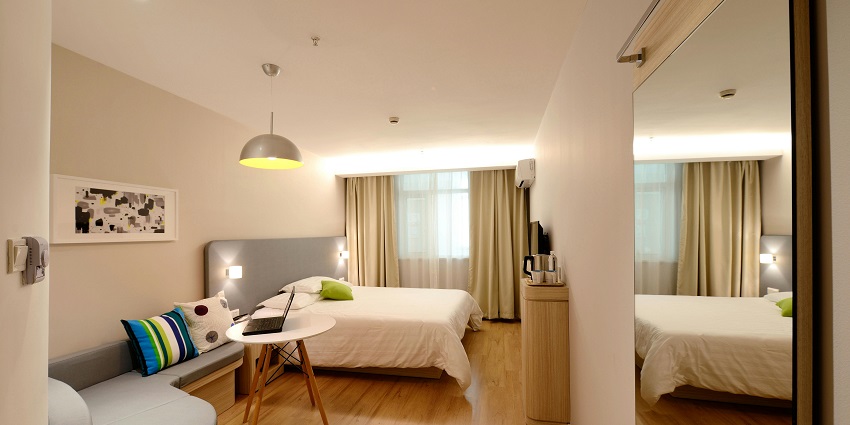
Photo: Pixabay / Pexels / Image For Representation Only
When visiting caves, travellers have various accommodation options in Aurangabad, ranging from budget hotels to luxury resorts. Some popular choices include Hotel Taj Residency, which offers comfortable rooms and modern amenities, and The Meadows Resort, known for its beautiful surroundings and excellent service. For budget-conscious travellers, Hotel Shiv Sagar provides clean accommodations at reasonable rates.
Where To Eat

Photo: Marvin Ozz / Pexels / Image For Representation Only
Aurangabad boasts a diverse culinary scene, offering visitors various dining options. Café 1730 is a popular restaurant known for its delicious Indian and continental cuisine, offering a cosy ambience and friendly service. Hotel Shree Durga is a must-visit for those craving authentic Mughlai cuisine, serving flavorful biryanis, kebabs, and curries. For a quick bite or local street food experience, head to Jai Maharashtra, where you can savour traditional Maharashtrian snacks like vada pav and puri bhaji.
Suggested Read: Best Food In Shirdi
Best Time To Visit
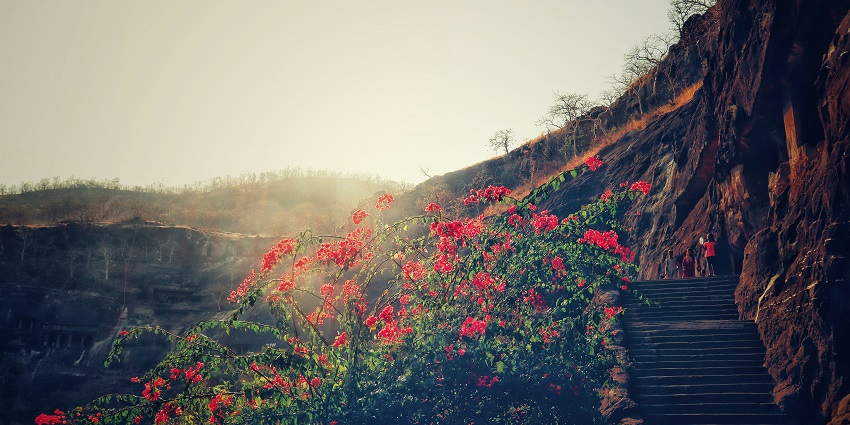
Photo: Priyanka Singh / Wikimedia Commons / Image For Representation Only
The best time to visit caves is during the winter months (November to February) when the weather is pleasant and ideal for exploring the caves. Temperatures range between 10°C to 25°C (50°F to 77°F), providing comfortable conditions for outdoor activities.
Other Factors To Consider

Photo: ian dooley / Unsplash / Image For Representation Only
Average Cost Of The Trip
The average trip cost to caves can vary based on individual preferences. Budgeting around ₹1,500 to ₹3,000 per person for a day trip, excluding accommodation, would provide a comfortable experience.
Tips For Travellers
- Start Early: Begin your day early to avoid crowds and enjoy a more serene experience at the caves.
- Bring a Camera: Capture the rock-cut architecture and sculptures, but respect any photography restrictions.
- Wear Sunscreen: Protect yourself from the sun, especially when visiting during the warmer months.
- Stay Hydrated: Carry a water bottle while walking around the caves.
- Research in Advance: Familiarize yourself with the history and significance of the caves to enhance your visit.
Suggested Read: Places To Visit Near Alandi For A Refreshing Retreat
The Ajanta and Ellora Caves are unique structures that showcase India’s rich culture and art. The detailed carvings and beautiful paintings share stories about ancient civilizations and their beliefs. Visiting these caves offers a unique opportunity to connect with India’s history and artistry. For a seamless travel experience filled with unforgettable memories, plan a trip with TripXL, your trusted partner for exploring the hidden treasures of India.
Cover Photo: Siddhesh Mangela / Unsplash / Image For Representation Only


 WhatsApp
WhatsApp
 Twitter
Twitter









